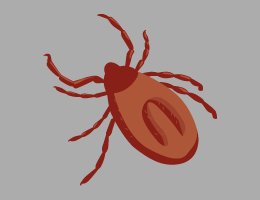
Jan. 11, 2019—A tick that normally lives on the other side of the globe has made it to the U.S. And public health experts say it's potentially dangerous.
The Asian longhorned tick was first discovered in the U.S. on a New Jersey sheep in 2017. It has since spread to Connecticut, Maryland, North Carolina, New York, Pennsylvania, Virginia, West Virginia and even farther west, to Arkansas. The tick has also been found in other domestic animals besides sheep, as well as in various types of wildlife and in two people.
So far, no harmful germs have been found in Asian longhorned ticks that have been collected in the U.S. And no people or animals have gotten sick as a result of being bitten by this new tick. But experts with the Centers for Disease Control and Prevention (CDC) and other agencies are looking into that possible threat.
And with good reason: In other countries where the Asian longhorned tick exists—China and Japan, for instance—its bite has spread diseases such as hemorrhagic fever and Japanese spotted fever. What's more, female Asian longhorned ticks can reproduce without mating, which may allow it to quickly spread in new places.
Despite concerns, it's not yet clear if the new tick will pose a major problem in the U.S. That's what officials are investigating. They want to know, for instance, what kinds of germs it may harbor in the U.S. and how often it bites animals and people.
The tick doesn't just pose a possible threat to people. In some regions where the tick has spread, it has caused dairy cattle to produce less milk.
Meanwhile, researchers in the U.S. are actively looking for the Asian longhorned tick to see where it might show up next. If you find any tick on yourself or on a pet or other animal, CDC says you should immediately remove it. The tick can be saved in rubbing alcohol in a jar or a freezer bag and taken to a health department or other local agency for identification.
How to evict a tick
Found a tick? Here's how to safely remove it.